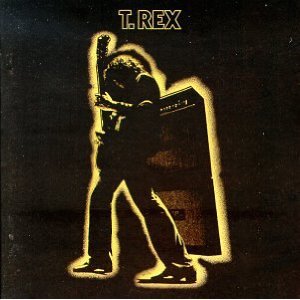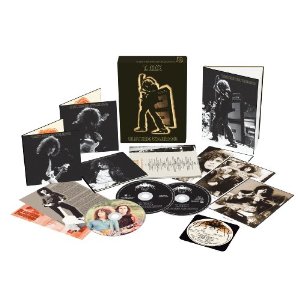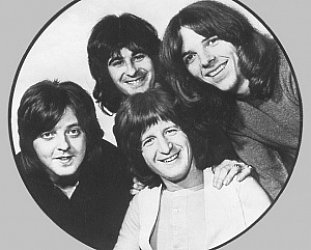Graham Reid | | 2 min read
T.Rex: Planet Queen

By the time of the Tanx album in 1973, things were starting to go sour for T.Rex's frontman Marc Bolan. He hadn't cared when his old champion John Peel had dismissed his glam pop for its shallowness, or that Bowie and others were starting to snap at his heels. He was in fact oblivious to it all, he was far too busy being the star he always wanted to be.
So he perhaps never noticed that the young girls who screamed in '71 were now looking for something more than glam pop. He was still selling records, but the critics were becoming even more scathing -- and the songs just weren't up to it.
In his glam pop persona, Bolan was always a singles artist, and he could write some great ones: Ride a White Swan and Hot Love announced the glam era in '70 and '71.
And his excellent Electric Warrior album, produced by Tony Visconti, was a collection of great singles. You could have thrown just about every track at radio and it would have stuck. The ones that did were Get It On and Jeepster, with that bewildering line "I'm just a jeepster for your love . . . and I'm gonna suck ya".
However as Willie Dixon noted in Back Door Man, "the men don't know, but the little girls understand". And the little girls screaming for Marc understood very well what he was about.
It was for such innuendo, orgasmic whimpers and increasingly simplistic lyrics ("get it on, bang a gong") as much as his embrace of electric pop that Peel and others who had applauded Bolan's acoustic hippie poetry turned on him.
But they didn't get that pop music is made of such stuff, and if the songs had a sleazy beat, and were short and catchy then they would work even better. Bolan's songs on Electric Warrior were all that -- and more. It was his finest hour -- or 40 minutes actually.
Ignored in most discussion of Bolan -- which tends to turn on his two great years, three out of the spotlight in a bloated decline, then sudden death -- is what a great guitar player he was. His playing was pointed and tight, and -- as with his lyrics which were self-contained -- there was no wasted energy.
Gone were the meanderings of old, Bolan was intensely focused with Electric Warrior.
 One of the few durable glam-rock,
power-pop albums of the early Seventies, Electric Warrior was Marc
Bolan in command of the three minute single, catchy pop with taut and
sometimes bluesy guitar solos and a camp strut that was fun,
especially when it came with his pixie outfits from the dress-up box.
One of the few durable glam-rock,
power-pop albums of the early Seventies, Electric Warrior was Marc
Bolan in command of the three minute single, catchy pop with taut and
sometimes bluesy guitar solos and a camp strut that was fun,
especially when it came with his pixie outfits from the dress-up box.
The expanded 40th anniversary set – three CDs and a terrific DVD of television appearances which capture his infectious enthusiasm – might be a bit much for most, but he certainly puts boy bands like One Direction in perspective.
Here was pure talent distilled into punky pop, memorable nonsense songs and topped off by curly locks. No wonder the little girls screamed.
The original album (all you really need) is the ideal running length, two sides of vinyl and 11 songs which move from the slinky Mambo Sun through quasi-ballads ("I could have loved you girl, like a planet"), the tough wee hits, some glam-blues on Lean Woman Blues, and at the end the raw Rip Off with those classic, stupid lines "dancing in the nude, feeling such a dude".
I'm sure the little girls understand that one, even today.
There is also Life's a Gas, "I hope it's gonna last".
Didn't of course.
But Electric Warrior does.
And that's the other thing which serious rock critics don't get about disposable pop. It isn't disposable at all. It never goes away.
These Essential Elsewhere pages deliberately point to albums which you might not have thought of, or have even heard . . .
But they might just open a door into a new kind of music, or an artist you didn't know of.
Or someone you may have thought was just plain boring.
But here is the way into a new/interesting/different music . . .
Jump in.
The deep end won't be out of your depth . . .







Ineka - Nov 15, 2010
Couldn't agree more. I absolutely love this album - it's like musical Prozac! The embarrassing phrase that always comes to mind when listening to it: 'now, THAT's a rare groove...'
SaveGeorge Henderson - May 7, 2012
Another great thing about T-Rextasy;
Saveeveryone who bought T Rex records in the early days, when there weren't many of them, also bought the Tyrannosaurus Rex double-LP reissues. And if they bought this set
http://thequietus.com/articles/07311-luke-haines-favourite-albums?page=5
they got a rare treat.
This is sculpting sound with acoustic instruments, musical toys, voices, and the studio.
Think of Tall Dwarfs, Flight of the Concords, or Baader Meinhoff to appreciate how influential these albums were......
Clive - Dec 14, 2023
You are right Graham,have not played it for years,will put it on now
Savepost a comment